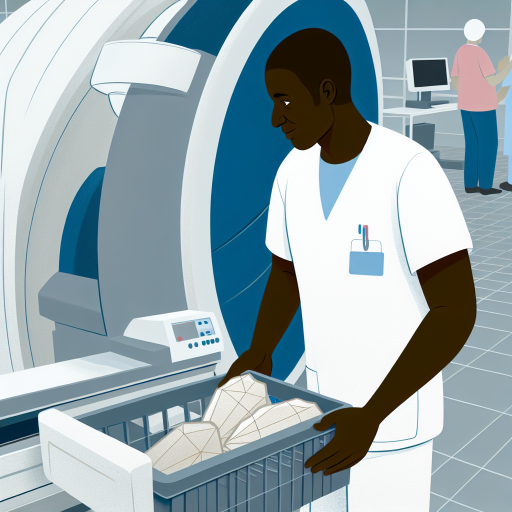Introduction:
Anatomical pathology equipment plays a vital role in healthcare settings by aiding in the diagnosis and treatment of various diseases.
These equipment are essential for analyzing tissue samples, identifying infections, and detecting cancer.
In Nigeria, there are significant challenges and limitations regarding access to modern anatomical pathology equipment.
The lack of funding, inadequate infrastructure, and limited trained personnel hinder the country’s ability to provide accurate and timely diagnostic services.
Histology Equipment:
Histology equipment plays a crucial role in examining tissue samples for diagnostic purposes.
Commonly used equipment includes microtomes for slicing thin sections, tissue processors for tissue preparation, and staining machines for enhancing visibility.
Challenges in Nigeria include limited access to modern histology equipment due to cost and maintenance issues.
- Histology equipment plays a crucial role in examining tissue samples for diagnostic purposes.
- Commonly used equipment includes microtomes for slicing thin sections, tissue processors for tissue preparation, and staining machines for enhancing visibility.
- Challenges in Nigeria include limited access to modern histology equipment due to cost and maintenance issues.
Autopsy Equipment:
- Importance of autopsy equipment in determining cause of death.
- Overview of equipment like autopsy tables, scales, and body bags.
- Lack of modern autopsy equipment in many Nigerian hospitals and its impact on forensic investigations.
Autopsy equipment is vital in determining the cause of death. It plays a crucial role in forensic investigations.
Importance of Autopsy Equipment
Autopsy equipment is essential for conducting post-mortem examinations to establish the cause of death accurately.
It includes various tools and instruments that are used by pathologists and forensic experts to examine deceased individuals thoroughly.
These examinations are crucial in providing valuable information about the circumstances surrounding a person’s death.
By carefully analyzing the organs, tissues, and other bodily structures, pathologists can uncover important details that may help solve criminal cases.
They can establish the cause of accidents or fatalities or identify potential health risks.
Without proper autopsy equipment, pathologists would be unable to perform thorough examinations, leading to incomplete or inaccurate results.
As a result, the importance of having access to high-quality autopsy equipment cannot be overstated.
Overview of Autopsy Equipment
Autopsy equipment includes a range of tools and devices designed to facilitate post-mortem examinations.
Some of the essential equipment used in autopsies includes:
- Autopsy tables: These specialized tables are used to support and position the body during the examination. They are designed to accommodate the weight and size of deceased individuals and provide a stable surface for the pathologist to work on.
- Scales: Accurate weighing of organs and body parts is essential in determining the cause of death. Scales used in autopsies are calibrated to provide precise measurements, allowing pathologists to calculate the weight of organs and tissues accurately.
- Body bags: After the autopsy is completed, the body is placed in a body bag for transport and storage. Body bags are designed to preserve the integrity of the body and prevent contamination during handling and transportation.
These equipment are essential for conducting comprehensive and meticulous post-mortem examinations that yield accurate and reliable results.
Lack of Modern Autopsy Equipment in Nigerian Hospitals
Despite the importance of autopsy equipment, many hospitals in Nigeria lack access to modern and specialized equipment for conducting post-mortem examinations.
This lack of equipment has significant implications for forensic investigations and the delivery of justice in Nigeria.
Without access to proper autopsy equipment, pathologists and forensic experts may struggle to perform thorough examinations, leading to incomplete or inconclusive results.
Additionally, the absence of modern autopsy equipment hampers the ability of Nigerian hospitals to keep up with international standards in forensic medicine.
This can impact the credibility of forensic investigations and may hinder the resolution of criminal cases or the identification of public health risks.
Efforts should be made to improve access to modern autopsy equipment in Nigerian hospitals to ensure the effective and reliable performance of post-mortem examinations.
See Related Content: Popular Veterinary Clinics in Major Nigerian Cities
Digital Imaging Equipment
Discussion on the use of digital imaging equipment such as digital pathology scanners.
Benefits of digital pathology in improving diagnostic accuracy and efficiency.
Limited access to digital imaging equipment in Nigeria and its implications on patient care.
Digital imaging equipment, such as digital pathology scanners, revolutionize the way anatomical pathology is conducted.
These scanners capture high-resolution images of tissue samples, allowing pathologists to view them digitally.
One of the key benefits of digital pathology is its ability to improve diagnostic accuracy and efficiency.
With digital images, pathologists can zoom in on specific areas, enhance image quality, and share images for consultation with colleagues.
However, in Nigeria, there is limited access to digital imaging equipment, which poses significant challenges for patient care.
Without access to digital pathology scanners, pathologists may rely on traditional methods that can be time-consuming and less accurate.
The lack of digital imaging equipment in Nigeria also hinders the adoption of telepathology.
This limitation can impact the timely diagnosis and treatment of patients, especially in underserved areas.
To address the issue of limited access to digital imaging equipment in Nigeria, investment in infrastructure and training is essential.
By providing pathologists with the tools and resources they need, healthcare facilities can improve diagnostic capabilities.
Ultimately, this will enhance patient care.
Uncover the Details: Top Nigerian Universities for Medical Microbiology
Transform Your Career with Expert Guidance
Get personalized mentorship consulting that’s tailored to your unique path. Our expert advice is actionable and exclusive.
Get StartedTissue Processing Equipment in Anatomical Pathology
Tissue processing equipment plays a crucial role in preserving tissue samples for examination in anatomical pathology.
These machines are essential for preparing tissue specimens for microscopic analysis.
They aid in the diagnosis and treatment of various diseases.
Role of Tissue Processing Equipment in Preserving Tissue Samples for Examination
Tissue processing equipment ensures that tissue samples are properly preserved and prepared for analysis.
This equipment helps to maintain the integrity of the tissue samples.
It allows pathologists to make accurate diagnoses.
Overview of Instruments like Tissue Cassettes, Embedding Centers, and Cryostats
Tissue cassettes are used to hold tissue specimens during processing.
Embedding centers assist in embedding tissue samples in paraffin wax for slicing and mounting on slides.
Cryostats are used for frozen sectioning of tissues for rapid diagnosis during surgery.
Challenges Faced in Maintaining and Servicing Tissue Processing Equipment in Nigerian Labs
In Nigeria, labs encounter various challenges in maintaining and servicing tissue processing equipment.
Challenges include the high cost of maintenance.
They also face difficulties in sourcing spare parts and a lack of technical expertise.
- High cost of maintenance
- Difficulties in sourcing spare parts
- Lack of technical expertise
Laboratories in Nigeria often struggle with the high cost of maintaining tissue processing equipment.
The limited budget allocated for equipment maintenance can lead to delays in servicing.
This affects the quality of tissue samples processed.
Another challenge faced by labs in Nigeria is the difficulty in sourcing spare parts.
The lack of local suppliers and long lead times for importing parts can prolong equipment downtime.
This directly impacts lab operations.
There is a shortage of technical expertise in servicing tissue processing equipment in Nigerian labs.
Limited training opportunities for technicians and engineers result in a lack of qualified personnel.
This leads to inefficiencies in lab operations.
Discover More: Restorative Dentistry Techniques for Dental Implants

Cytology Equipment:
Cytology equipment is essential for examining cells to detect abnormalities or diseases.
It includes various tools such as microscopes, centrifuges, and cytocentrifuges that are used in laboratories for analyzing cell samples.
Microscopes are used to magnify cell samples for detailed examination.
This allows healthcare professionals to identify any abnormalities present.
Centrifuges are utilized for separating cells from the surrounding fluid.
This enables further analysis of the cell components.
Cytocentrifuges are specialized devices that concentrate cells onto a slide for examination.
They provide a concentrated sample for detailed inspection.
These equipment play a crucial role in diagnosing conditions such as cancer, infections, and other diseases at a cellular level.
However, one of the challenges faced in Nigerian healthcare facilities is the inadequate training and expertise in operating cytology equipment.
Due to limited resources and access to specialized training programs, healthcare professionals may not have the necessary skills to effectively use these tools for accurate diagnosis.
This lack of training can result in misinterpretation of cell samples.
It may lead to incorrect diagnoses and delayed treatment for patients.
It highlights the need for investing in training programs.
Ensuring healthcare workers have the knowledge and skills to operate cytology equipment effectively is essential.
Cytology equipment is vital for diagnosing diseases and conditions at a cellular level.
However, in Nigerian healthcare settings, there is a need to address the challenges of inadequate training and expertise.
This will ensure accurate diagnoses and improve patient outcomes.
Find Out More: Impact of Tobacco on Oral Health in Nigeria
Safety equipment plays a crucial role in ensuring the well-being of healthcare workers.
This equipment minimizes exposure to dangerous chemicals, toxins, and pathogens.
These hazards are often present in anatomical pathology laboratories.
Importance of safety equipment in protecting healthcare workers from hazardous substances:
Safety equipment plays a crucial role in ensuring the well-being of healthcare workers by minimizing exposure to dangerous chemicals, toxins, and pathogens present in anatomical pathology laboratories.
Description of items like fume hoods, protective gear, and waste disposal containers:
-
Fume hoods: These devices help to contain and safely remove harmful fumes and vapors generated during laboratory procedures.
-
Protective gear: This includes items such as gloves, lab coats, goggles, and face masks, which offer physical protection against hazardous materials.
-
Waste disposal containers: These are specially designed containers for the safe disposal of biohazardous waste, sharps, and other contaminated items.
Lack of comprehensive safety equipment in many Nigerian labs and consequent health risks:
Sadly, many anatomical pathology laboratories in Nigeria lack adequate safety equipment.
This deficiency puts healthcare workers at risk of exposure to harmful substances.
The lack of protection can lead to serious health complications and infections among lab personnel.
Importance of Anatomical Pathology Equipment in Nigeria
The use of anatomical pathology equipment in Nigeria is crucial for accurate diagnosis and treatment.
Investing in advanced equipment can greatly improve healthcare services and patient outcomes in the country.
Having access to modern equipment is essential for the efficient functioning of pathology labs.
There is a pressing need for increased investment in anatomical pathology equipment in Nigeria.
This investment will help to keep up with global standards and provide better healthcare for the population.
Stakeholders must prioritize upgrading equipment in medical facilities across the country.
Ultimately, this will lead to improved diagnostic capabilities and better patient care in Nigeria.
Additional Resources
A Pathology Trailblazer’s Journey from Nigeria to the Bronx: Q&A …
Anatomy Education in Nigeria: An Empirical Study of Students …




